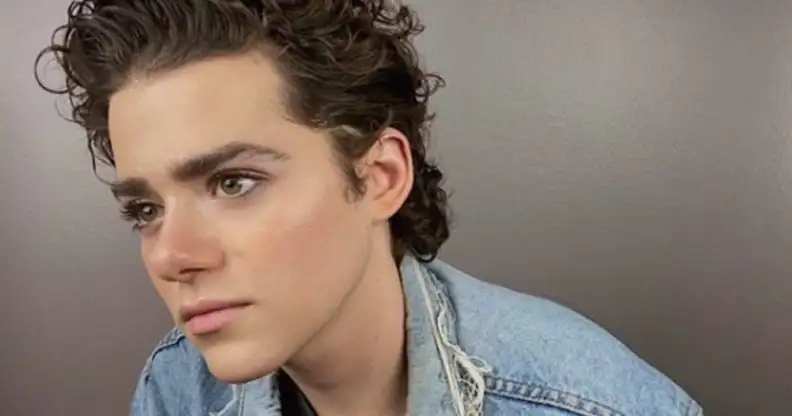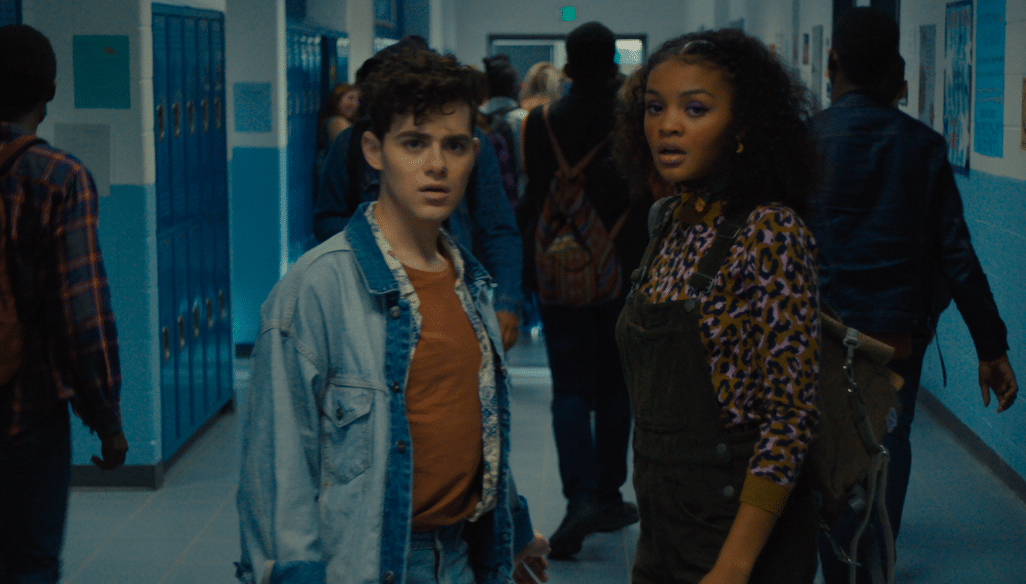Freaky star Misha Osherovich on horror being inherently queer: ‘It’s about people who are othered’

Non-binary actor Misha Osherovitch (Instagram/@ mishaosherovich)
If you’re looking for queer-positive horror this spooky season, Misha Osherovich has got you covered.
The non-binary actor is best known for their role in Freaky – a gory bodyshock horror with a very queer core – as well as the new supernatural drama The Girl in The Woods, coming to Peacock/Crypt this month.
Ahead of the new release, PinkNews spoke to the star about queer horror tropes, stanning icons and discovering their gender identity.
Freaky is out now on DVD and Blu-ray.
PinkNews: Were you a fan of the horror genre before Freaky?
Misha Osherovich: I’m realising I was but I had almost no concept of horror as kind of a holistic genre. Until not even shooting Freaky. I learned a lot during Freaky but afterwards, I moved to LA and I got so deeply steeped in this very particular queer horror mini kingdom that actually exists in LA and all of a sudden, I’m talking with these folks and I’m realising not only does horror have such a following, but a genre culture around it. But queer horror in particular is a very specific lane of Hollywood that exists and has a long history of subverting stereotypes and telling very particular stories. I’m only now kind of learning about all that because of Freaky.
Have you figured out what makes horror appeal so much to the queer community?
I’m still discovering it. But I think one thing in particular is, I mean, look, it’s no secret that during this pandemic I’ve been discovering my own queerness. I’ve come out as non-binary and I’ve kind of learned about my gender expressions around being home alone with myself staring in the mirror far too much. I think there’s this element of, whether it’s vampires or monsters or just outsiders. Horror is often a genre about an outsider, it’s often a genre about people that are othered. So I think queer people naturally, obviously, feel othered and being queer is as much celebrating being in the other as it is often fighting against the challenges of being othered by society.
Horror tackles those issues in a really accessible, entertaining/scary/enjoyable way. I think it’s a really refreshing way to deal with these issues that’s not just a queer rights documentary.
How was your experience appearing in a queer-positive horror movie?
Oh, it was just lovely all around. I mean, truly, even from the get go auditioning for it. We have Chris Landon, Michael Kennedy, co writers and a director [Landon] that are both incredibly queer and proud of being queer. Playing the headlining queer character in the whole thing, I just felt a lot of love from the team from the get go. At the end of the day, it’s two gay guys writing a film about how they wish they had this kind of gay, super powered sassy high schooler that they never got to experience when they were that young. I felt the queer importance of it from the get, which is really cool.
Do you think it made much of a difference for you having queer writers and producers?
Absolutely. Even from auditioning with Chris, he asked me in particular, is there anything that he should know about me or how I would approach the role? And I told him, “Look, if you give me this character, if you give me this role, I’m going to make this kid a real human. I’m not in the business of playing a trope, or playing a stereotype.” Apparently I said the right thing. Then actually I got really close with our writer Michael Kennedy and throughout shooting he even he started adjusting some of the language of how I spoke based on my queer speak and the Gen Z slang that I’m always whipping out. Overall I felt that the queer team behind it was very integral to me not coming across like a really – to be frank – really freakin’ annoying stereotype.
View this post on Instagram
How would you say that representation is now, compared to what you would have seen when you were younger? Is there more visibility?
Absolutely. I had no vocabulary for queerness, or non-binary, from when I was younger. But when it comes to now, I think that Hollywood is doing that amazing thing that Hollywood does, which is swinging the pendulum very far. We had things like Pose where trans identity becomes so incredibly important. That had the trickle down effect of creating trans roles in so many other projects. Because, quite frankly, people wanted to hop on a trend, but it’s also legitimately providing representation.
I’m actually very excited now that we’ve very much opened up our view of what gender is, especially in Hollywood, to see gender non-binary, gender queer, gender non-conforming roles, that kind of permeate scripts in a really impactful way. So maybe a year or less from now we’ll see movies like Freaky that instead of having a powerhouse gay character, they have a powerhouse non-binary character.
Who did you stan growing up?
Oh goodness, so I was very sheltered. Literally, I’m talking about stanning The Little Mermaid, the animated one. I remember my sister had a Britney Spears CD and that was one of my first exposures to female pop stars. I thought it was just wildly entertaining and amazing. But honestly, I mean, I will always say Lady Gaga, she in particular got me through rehab, and she’s one of those humans that if I meet, I will sob.
View this post on Instagram
One of the brilliant things about being queer is the older that you get, so many things that you’ve appreciated before you see in a whole new light when you look at them with a queer gaze.
Oh, absolutely. I’ll never forget when I first saw this meme on Instagram, “When I thought I had a crush on a female pop star growing up and now I realise I was just stanning.” I don’t think that there’s a more accurate way to at least describe how I see pop culture.
I’m finally able right now to embrace the highly feminine side of me, I’m finally auditioning for queer non-binary roles – my makeup, my heels, my voice, my nails are all being appreciated by both myself and the outside world all of a sudden, and now I’m finally realising why I have this affinity for the strong female lead in a film, especially a film that’s so sexy and powerful like Jennifer’s Body, because that’s the kind of power that I really do hope to see in me and that I see as kind of top for Misha.
You mentioned discovering yourself recently in lockdown – can you speak a little more about that journey?
I grew up in a really conservative household. So right off the bat just being gay outright was an issue. But once I honestly had a beat to sit alone, and after I just shot my first major film, and I just moved to Hollywood… And it’s not even so much deciding about who I wanted Misha to be in the public eye. But I’m a big mental health advocate, I’m a big mental health human in general and the pressure to be even remotely fitting kind of what I call the “WeHo / Hells Kitchen gay mold” of a semi masculine gay man, just started to feel so ridiculously uncomfortable to me. And just kind of realising that I very much fall outside of the gender binary and, if I had to pick, I actually gear more towards the femme side of things.
It was literally just like a physical weight lifted off my shoulders, I could move about my tiny little apartment easier. That’s how directly I felt that realisation. So if that’s how good realising a new part of my gender identity feels, I don’t necessarily want to ever get off that train. I’m finally feeling quite at home, not just in my body, but in my emotional self because of it all.
View this post on Instagram
Was there a point when it actually clicked for you?
I’ve spent many, many years wrestling with what queerness even means, but for me, if you’re gonna ask the moment that it clicked, it was literally, my roommate was away and staying with his boyfriend for a certain part of the pandemic. I was at home, I’ve been writing a lot in my latest project and received this latest draft, I had not much to do. I was very much just sitting and thinking about my existential existence. I’m somebody who, when it comes to, especially, body image, I quite frankly cover myself up even when I’m at home, because I have some of those really rampant body image issues that cause me to feel shame when no one’s watching, which is something I’m working on in therapy.
But I hit this moment where I said, “You know, I think I might be non binary, I don’t think I’m a man,” it’s kind of the rejection of the he/him that I was tackling. I said it very quietly out loud to myself. I felt literally inspired to throw a naked dance party in my apartment and that’s not something that I very often do, because I don’t often have that much joy about existing inside my body. So the fact that it inspired that kind of moment really made clear to me that this gender thing is something that I should take seriously.
What positive changes have come from being able to come out as non-binary?
One thing that’s definitely come out of all of it is the acting has actually gotten not only easier, but I’m auditioning for roles that I actually relate to. I’ve been lately auditioning for non-binary roles and queer roles and the scripts that are kind of coming across my desk, if you will, are actually quite authentic. It’s some of the best acting I think I’ve ever delivered. Because I’m finally playing roles that actually relate to my soul and I’m not pretending to be your straight boy around the corner or even gay boy around the corner.
But also I’m a writer, and as of late my writing has gotten just that much easier, stronger, and kind of a more consistent flow, because I’m writing from a very honest place, that place being the queer non-binary of it all… Socialising has gotten just that much easier for me because I don’t put the pressure on myself to be something that I’m very literally not.
LA can be an incredibly toxic place when it comes to how people perceive you. So if you’ve walked into – whether it’s digital or literal – a room with the understanding that you’re not going to change who you are to make other people happy, it’s a powerful statement and it’s a good weapon in my arsenal.
View this post on Instagram


